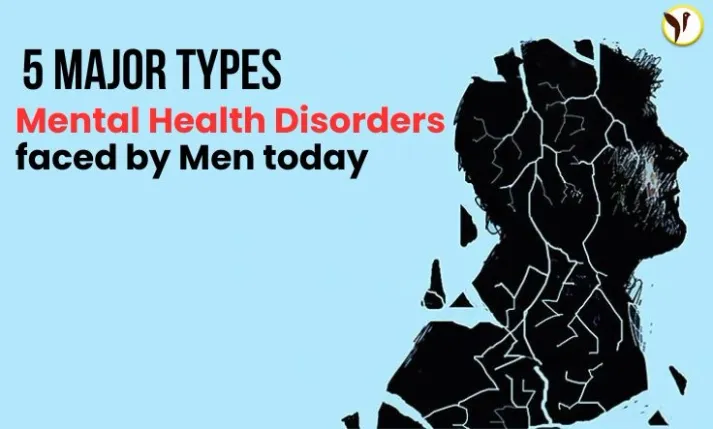In this rapidly transforming era, the conversation about mental health has taken center stage, casting light on the intricate fabric of our emotional well-being. While it is true that mental health recognizes no gender boundaries, it is becoming increasingly clear that men face their own set of issues. This article looks at the wide range of mental illnesses that impact men in modern culture.
This article aims to break down the taboo and misunderstanding surrounding men's mental health through a detailed examination of various mental health issues. We hope to build a deeper awareness of the issues males experience by going into the psychological complexity of diseases such as substance misuse, PTSD, and mood disorders. Here we are listing five major types of Mental health disorders faced by men today-
1. Depression
Men's depression is a major mental health problem marked by constant sadness, low energy, and loss of interest. While men are less likely to be diagnosed, symptoms such as restlessness, anger, or physical complaints might occur. According to research, societal pressures to conform to traditional masculine stereotypes can prevent men from seeking help. In the United States, roughly 9% of males experience serious depressive episodes, with estimates perhaps understated due to stigma. Promoting open discussion and mental health awareness can help to de-stigmatize depression and support men's mental health.
Professional counseling, medicines if necessary, regular exercise, a balanced diet, adequate sleep, and strong social support are all part of treating depression in males. Getting support and communicating openly are critical steps toward recovery.
2. Anxiety Disorders
Anxiety disorders affect men, with around 10-12% of men experiencing them at some point. Common types include generalized anxiety disorder, social anxiety disorder, and panic disorder. Research suggests that men might underreport their symptoms due to societal expectations, leading to a potential underdiagnosis. Men with anxiety often present symptoms such as irritability, anger, or substance abuse rather than traditional signs. Addressing the stigma surrounding mental health and providing tailored support is crucial for accurate diagnosis and effective treatment in men.
A mix of interventions such as cognitive-behavioral therapy (CBT), medication, and lifestyle changes can be useful in treating anxiety disorders in men. Getting expert assistance and practicing relaxation techniques can help with symptom management and general well-being.
3. Bipolar Disorder
Bipolar Disorder in men is a mental illness characterized by significant mood fluctuations ranging from depressive lows to manic highs. Despite the fact that episodes are largely comparable between genders, some research suggests that men may have more severe manic episodes. According to a study published in the Journal of Affective Disorders, men with bipolar illness have higher rates of substance abuse and aggressive behaviors during manic episodes than women. Early detection and treatment are critical for minimizing the disorder's impact on everyday living and overall well-being.
Men suffering from bipolar disorder can be treated with a mix of medication, counseling, and lifestyle changes. A proper diagnosis and specific treatment plan require consultation with a mental health specialist.
4. Schizophrenia
Schizophrenia is a complex mental condition that causes altered thoughts, feelings, and perceptions in men. It affects approximately 1.4% of the world's population. According to research, men often experience the onset of symptoms earlier than women, typically in their late teens or early twenties. Genetics, brain chemistry, and environmental stressors all play a role in its development. Antipsychotic medicines, counseling, and support are used in treatment. Early intervention is critical for improved outcomes in the management of this illness.
Schizophrenia treatment often consists of a combination of antipsychotic medicines, psychotherapy, and professional mental health assistance. Early intervention and continued care are critical for symptom management and overall quality of life.
5. Obsessive-Compulsive Disorder (OCD)
Obsessive-Compulsive Disorder (OCD) is a mental health problem characterized by persistent unwanted thoughts (obsessions) and repetitive behaviors or mental activities (compulsions). OCD affects approximately 2.2% of men. According to research, genetics and brain anatomy played a part in its development. Males with OCD have different patterns of obsessions and compulsions than women. Cognitive-behavioral therapy (CBT) and medication are effective therapies. Early Diagnosis and treatments are critical for symptom management and enhancing quality of life.
Therapy for OCD in men often consists of a combination of cognitive-behavioral therapy (CBT) and medication, most commonly SSRIs. A skilled mental health practitioner can provide specific counseling to manage and reduce OCD symptoms.
Men face a particular set of issues in today's complicated mental health landscape. This article has examined five important mental diseases affecting men, ranging from the weight of traditional cultural standards to the stigma associated with vulnerability. By bringing light to these issues—depression, anxiety, substance addiction, anger management, and body image—we seek to develop understanding and encourage open conversations. It is critical that we work together to dispel negative misconceptions, establish accessible support networks, and de-stigmatize receiving help. We can help men's mental health by doing so.
Also, read Neeraj Chopra's Winning Streak Ends at Zurich Diamond League 2023
Written by: Gauri Singhal







